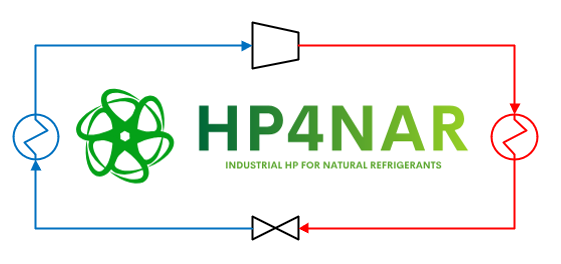HP4NAR — Next generation Heat Pumps with NAtural Refrigerants for district heating and cooling systems
Due to the need to decarbonize the heating sector, alternative pathways of producing heat are needed where large heat pumps (HP) can play an important role. To make optimal HP designs with high performance and wide operating range there is a need for a compressor test platform to ensure research advancements. The project will strengthen the already ongoing, related energy research at the department of Energy Technology KTH. Several EU and national funded projects are studying novel concepts concerning heat pump cycles and their key components. Exploration and utilization are ensured with a broad representation from industry and academia within the project group.

Background
The heating/cooling sector is responsible for around half of the energy consumption in Europe and a large part of the heat is produced in plants using fossil fuels. Due to the need to decarbonize the heating sector, alternative pathways of producing heat are needed where large heat pumps can play an important role. Large HPs currently represent only 2-3 GWth in Europe with the majority installed in Scandinavia.
The market interest for large scale heat pumps have been lingering the last decade but is now growing rapidly. Several reports show how large HPs could contribute to the transition of the heating and cooling sector. IEA report “The future of Heat Pumps” in December 2022 expresses the potential of large-scale HPs for decarbonizing the heating sector. Heat Roadmap Europe have modelled the integration of large HPs connected to district heating in Europe. Their conclusion is that the installed capacity of large HPs for district heating could be 95 GWth and supply 38% of the district heating demand [1]. Similar studies like SET-NAV study show even higher values [2].
Almost all synthetic refrigerants used in HPs today are environmentally harmful. F-gases which, according to the new F-gas regulation will be phased out completely by 2050. Most of the synthetic refrigerants also belong to the group of fluids called PFAS. Presently, there is a proposal in EU to ban the use of ALL PFAS. Moving towards natural refrigerants, the competences of optimal heat pump designs and on system level as well as safety aspects need more R&D.
To make an optimal HP design with high performance and wide operating range there is a need for a compressor testbed platform to ensure that the advanced numerical models have sufficient accuracy. By testing in a scaled rig, it is possible to obtain detailed measurements / data that can be used to verify the accuracy of the results from the numerical model.
Aim and objectives
-
Contribute to the development and optimization of large heat pumps using natural refrigerants to enable future heat pumps as well as retrofits for district heating and cooling systems and industrial applications.
-
Present innovative heat exchanger designs for heat pumps using natural refrigerants to minimize the refrigerant charge while maintaining high thermal performance.
-
Establish a test bed for necessary developments of compressors relevant for natural refrigerants.
-
To spread knowledge and publish project outcomes in scientific publications, seminars/workshops as well as in technical journals and at least one popular science magazine.
Project partners
-
Siemens Energy AB
-
Alfa Laval AB
-
Stockholm Exergi AB
Funding is provided by: Swedish Energy Agency (Energimyndigheten)
Timeframe: Sep 2024 – Dec 2028
Researchers
Postdoc (under recruitment)
Goerkem Balyaligil (gorkemb), Industrial PhD student, Siemens Energy AB
For further information about this project, please contact Jens Fridh.

References
[1] https://heatpumpingtechnologies.org/annex47/final-report-for-hpt-tcp-annex-47-heat-pumps-in-district-heating-and-cooling-systems/
[2] D.7.8: Summary report - Energy systems: Supply perspective. A report compiled within the H2020 project SET-Nav (work package 7), www.fraunhofer.de
